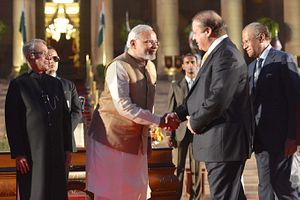In Pakistan’s strategic threat perception, India remains a self-evident and long-term threat. However, one can argue that while India will continue to remain Pakistan’s primary strategic threat, it is not interested in weakening or destroying Pakistan, as the prevailing narrative in the country might suggest. In fact, to the contrary, New Delhi fears Islamabad’s “instability more than its strength.”
As Stephen P. Cohen argues in his book, Shooting for a Century: The India Pakistan Conundrum, until a few years ago, the prospect of a “failed” Pakistan didn’t disturb India, but in the contemporary situation, given the rise of Islamic extremism in Pakistan, its acquisition of nuclear weapons, and the state’s economic weakness, the thought of a failed nuclear-armed state next door is worrying India more and more.
Daniel S. Markey maintains that despite having suffered from a number of Pakistan-based terrorist attacks, New Delhi doesn’t view the military conquest or the breakup of Pakistan as a realistic approach to resolve the long-standing rivalry; rather, it sees Pakistan as an enormous mess and “not one India would want to inherit even if it had the military tools to sweep across the border unobstructed.” Arguably, India’s security is increasingly dependent on Pakistan’s stability.
While remaining vigilant to provocations from Pakistan, in economic and military terms, India regards China’s rise as its utmost strategic priority and is concerned about how Beijing might restrain New Delhi’s own rise to global power status. Observers from Pakistan share this view as well: An eminent retired Pakistani diplomat, Munir Akram, argues that in contrast to earlier years, “India’s objective is no longer to undo partition and absorb the territories of Pakistan. The cost would far outweigh the benefit.”
Besides, India’s historic track record indicates that it has always welcomed any idea of talks and negotiations on issues that are mutually beneficial or negotiable. However, Pakistan clings to the position that the Kashmir dispute should be resolved first for any meaningful normalization to take place and that it has to be on Pakistan’s terms, which is unlikely to happen. As Christine Fair has argued, even if somehow the Kashmir dispute were to be resolved, Pakistan’s security paranoia would still persist and the country would continue to resist India’s inevitable regional or global rise.
Moreover, while India recognizes the reality of Pakistan’s existence, it doesn’t concede the ideological notion of the two-nation theory, which undercuts India’s own secular and nationalistic ideals. For instance, India is primarily different in that it doesn’t deem the issue of identity to be associated with its legitimacy, stability, and survival. Furthermore, unlike Pakistan, India doesn’t need a religious identity nor is Indian identity based on its opposition to Pakistan. On the other hand, Pakistan’s identity is bonded to an anti-India – or anti-Hindu India – approach, which in a way legitimizes Muslim communalism.
Arguably, this is an asymmetric rivalry, with Pakistan being the smaller and weaker state in terms of resources and power; however, the country’s leadership is not ready to accept this reality.
If Pakistan wants Indian understanding of its legitimate interests, then it must recognize those of others, which also involves India’s rightful apprehensions regarding China. Such apprehensions drive Pakistan to use non-state actors to engage India by keeping it preoccupied with a dyadic rivalry. Moreover, India’s growing engagement in Afghanistan and Central Asia is indicative of its resolve to play a more proactive role in regional affairs, Pakistan remains determined in countering this.

































